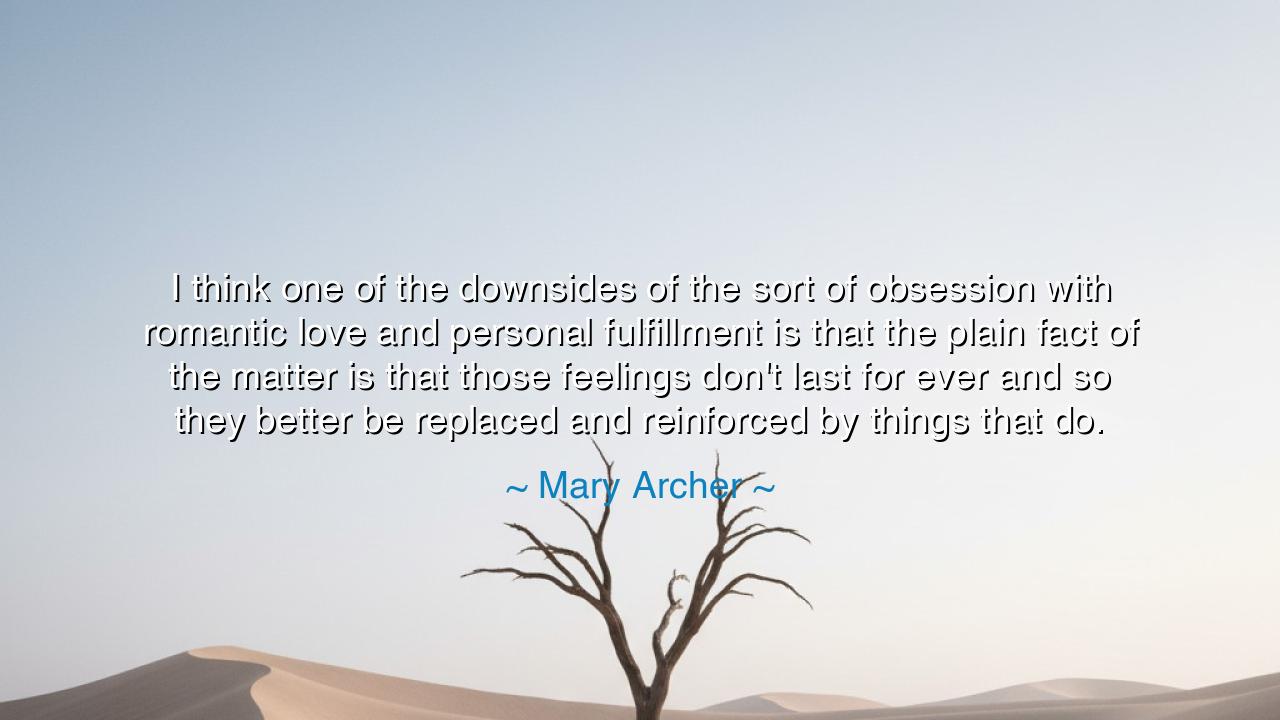
I think one of the downsides of the sort of obsession with
I think one of the downsides of the sort of obsession with romantic love and personal fulfillment is that the plain fact of the matter is that those feelings don't last for ever and so they better be replaced and reinforced by things that do.






The words of Mary Archer pierce like a double-edged sword of wisdom: “I think one of the downsides of the sort of obsession with romantic love and personal fulfillment is that the plain fact of the matter is that those feelings don’t last forever and so they better be replaced and reinforced by things that do.” Here she speaks not as a poet drunk on passion, but as a sage who has seen the fleeting nature of emotion. For romantic love, wondrous though it is, burns like a fire that must be tended; if left alone, it will fade. Archer’s warning is that to obsess over the flame without laying stones for the hearth is to be left in darkness when the fire burns low.
The ancients knew this truth well. They spoke often of eros, the fiery passion that sweeps through the heart like a storm, but they also taught of agape and philia, the deeper forms of love—steadfast devotion, friendship, and shared duty. Archer’s words echo these distinctions. To live only for passion and personal fulfillment is to build a house upon sand, for the tides of time will wash it away. But to build upon honor, loyalty, and shared purpose is to create foundations that endure beyond the passing of emotion.
Consider the story of Marcus Aurelius, the Roman emperor and philosopher. He loved deeply, yet he did not deceive himself with the permanence of passion. Instead, he rooted his life in duty, virtue, and service. When grief struck and companions passed away, his strength endured, because it rested not on fleeting feelings, but on eternal principles. His life stands as an example of Archer’s teaching: that while the heart may soar and sink with changing affections, the soul can be anchored in what lasts.
Archer also reminds us of the danger in our age: an obsession with romance, with personal satisfaction, with chasing the intoxicating high of the heart. Too many abandon the bonds of marriage, family, and community when the first flame cools, believing that love has “died.” Yet the truth is otherwise: passion may ebb, but it can be transformed—replaced and reinforced—by trust, sacrifice, and mutual respect. The lovers who endure are not those who chase new fires, but those who learn to keep the embers alive through steady care.
There is humility in her words as well. To admit that feelings don’t last forever is to acknowledge that love is more than a feeling; it is a choice, a discipline, a vow renewed each day. The knight who swears loyalty to his lord does not serve only when it is convenient. In the same way, the soul who commits to another must be ready to love not only in passion’s height but also in weariness, in silence, in hardship. This is where true romance is tested—not in the ecstasy of beginnings, but in the endurance of years.
The lesson is clear: do not despise the beauty of passion, but do not mistake it for eternity. Treasure it while it burns, but learn to build upon what lasts. Let kindness, patience, forgiveness, and shared purpose be the stones of your foundation. When passion wanes, these will sustain you. When storms come, they will hold you fast. Love is not diminished by this truth; it is deepened, refined, made strong.
Therefore, let all who hear take action: If you are in love, cherish the fire, but also plant roots. Nurture friendship with your beloved, honor your promises, and build a life of shared meaning. Seek not only the thrill of fulfillment, but the strength of commitment. For in the end, Mary Archer speaks with the voice of the ancients: passion may pass, but love built on duty and devotion endures forever.






AAdministratorAdministrator
Welcome, honored guests. Please leave a comment, we will respond soon